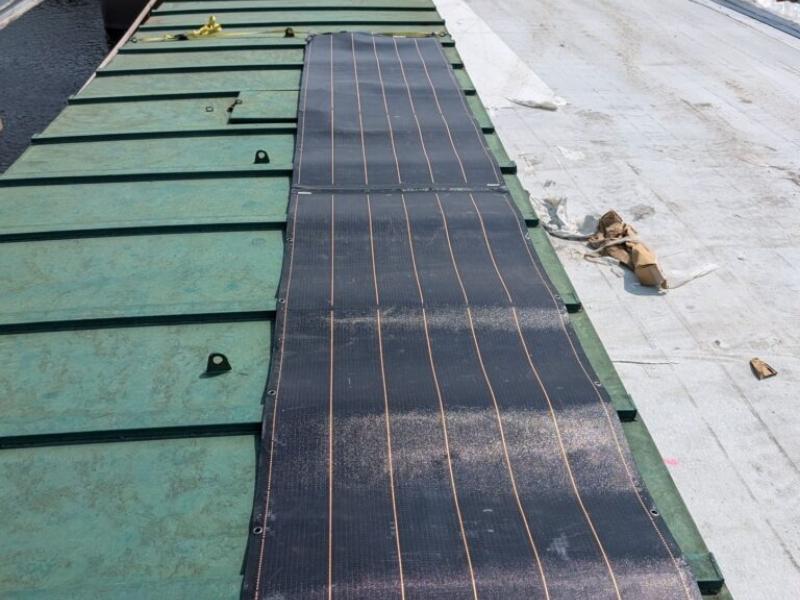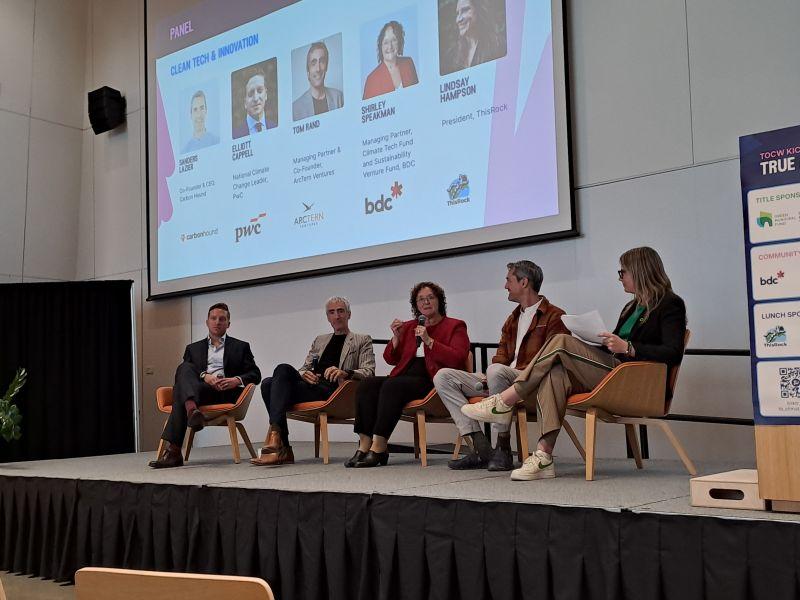
Bernard Tan, a groundbreaker in sustainable financing, sees a future for Canada to lead the renewables and clean technology industries if all sectors in the country and the federal government are able to get over their inertia.
Tan was recently recognized as one of Canada’s 2023 Clean50 Award honourees in the angel investors and ecosystem support category in his role as CEO of RE Royalties Ltd. – the first publicly traded royalty financing company focused on renewable and sustainable energy in Canada.
Recipients are announced annually by Toronto-based Delta Management Group and the Clean50 organization to recognize those 50 individuals or small teams, from 16 different categories, who have done the most to advance sustainability in Canada over the past two years.
Founded by Delta in June 2011, the Clean50 Awards are decided every September by Delta and a group of third-party advisors.
Founded in 2016 in Vancouver, RE Royalties (RE-X) went public in 2018. Over the past two years, it has led $38 million in investments across eight renewable energy clients. Those investments have generated over 543,000 MW-h of clean energy, removed 168,000 tonnes of carbon dioxide from the power grid and provided electricity for 88,000 homes.
"A few years ago, prior to starting the company, I was helping a clean-tech company in the renewable space with some of their financing plans. That was really when the light bulb moment happened, because no one was really doing this,” Tan explained.
“If you look at the resources sector, royalty financing is quite prevalent, that's a lot of resource projects get built. Yet that tool did not exist in renewables. So really, that light bulb moment started at that point where we pivoted and said, ‘Look, a lot of these companies need help in trying to get the projects off the ground. Why don't we do this?’ ”
RE Royalties currently owns over 100 royalties on solar, wind, hydro, battery storage, energy efficiency and renewable natural gas (RNG) projects in North America, Mexico and Europe.
The company’s COO Peter Leighton and board member Stephen Cheeseman, the CEO of Chinook Power Corp., are previous recipients of the award.
RE Royalties’ growth
“Our approach tends to be agnostic, I would say, in terms of how we look at deals and transactions,” Tan said. “So we don't really have a specific technology or specific location. Part of the reason behind that is we see the carbon issues as global.
"Current climate change doesn’t have borders.”
Tan said half of RE Royalties' approach to investments comes from its environmental good, and the other half of the equation is focused on generating strong economic returns for investors. Tan stated the company aims to invest in commercially proven technologies but would avoid, as an example, looking at the latest in carbon sequestration.
He sees Canada as a place where companies often get their start and then are unable to find the capital to grow. RE Royalties’ role is as a middle piece of the puzzle – what he referred to as acceleration capital.
In September, RE Royalties entered into a $1.3 million loan agreement with Switch Power Ontario Solar Operating Corporation, a subsidiary of Calgary-based independent power producer Switch Power Corp. The loan will finance the acquisition of a solar project in Vaughan, Ont., designed to generate 428 KW of direct current.
Also last month, the company made its first loan in Mexico – $1.86 million – with Vancouver-based Revolve Renewable Power Corp. It will support the purchase of battery and inverter equipment for three energy storage projects totalling 3.2 MW-h of capacity currently under development at a hotel chain in Cancun. Revolve recently completed project financing, which is scheduled to be fully commissioned in Q1 2023.
The future of RE Royalties
Looking ahead, the company is exploring areas like Latin America.
“We are definitely looking at opportunities in South America right now as well,” Tan said. “Definitely there are lots of opportunities there from a decarbonization aspect, but there's also a lot of good companies that are looking for capital.”
Currently, solar comprises about 37 per cent of the company’s investments, with energy storage making up 31 per cent. Tan expects that trend to continue, particularly in light of underwriting challenges surrounding other technologies like hydro and geothermal.
As he explained, geothermal doesn’t yet fit in with RE Royalties’ investment mandate. Regarding hydro, he’s skeptical thanks to the long-term effects of climate change which has made rainfall more difficult to predict.
“(It’s) been much more challenging finding those types of opportunities, because when we underwrite and we look at royalty for 20, 30 years, it's very difficult to predict a view that far out,” he said. “Solar, on the other hand, it's much easier because you have X amount of sunlight per day, it's not going to change much for the next several millennia.”
Canada and net-zero
With a background in the mining industry, Tan told SustainableBiz of the many royalties companies that propped up the industry in Canada around 20 years ago. His hope for 2030 onward is to have an ecosystem of royalty financing companies creating an ‘all hands on deck’ approach’ to fighting climate change and reaching net-zero goals.
In terms of Canada’s growth, Tan sees the country’s biggest potential being its people and the resource-rich land around us. He noted that many of the projects in oil and gas are global and that RE Royalties’ Mexico and European investments are with Canadian companies.
“In the Canadian context, I think the largest part that's really untapped is really that human potential that Canada is primed to create in very vibrant, clean tech/renewable type of economy.”
On the other hand, he also sees room for growth and a need for more focus in growing the clean tech economy.
“What we do see sometimes is our clients don't get necessarily the type of support that you would expect if they were a mining company, an oil and gas company, or a pure software-as-a-service company.”
From the government perspective, he’d like to see the recommendations from the federal government’s 2019 panel on sustainable finance come to fruition.
Part of that scheme involves looking at how governments can encourage more private capital into the climate finance sector. One recommendation detailed how the federal government could create tax advantages for Canadian citizens who invest their RRSP funds into clean-tech companies.
"I would say the biggest challenge is sometimes inertia, whether it's policy inertia, government inertia, regulatory inertia about trying to get it perfect coming out of the gate, when in fact, the world has kind of moved on,” Tan said. “That's my fear of whether we can get to net-zero. Because there always there always seems to be a lot of chatter that the action isn't necessarily there, or there quick enough.”










